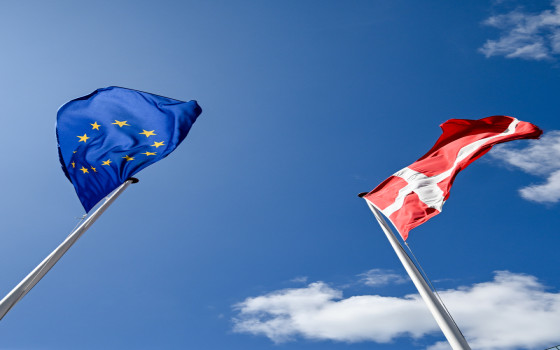
Supporting a strict immigration policy, European rearmament, and a lukewarm relationship with Washington, Denmark assumes the presidency of the European Union under the slogan "A strong, secure, competitive, and environmentally friendly Europe in a changing world."

- Europe and Arabs
- Saturday , 5 July 2025 14:26 PM GMT
Brussels: Europe and the Arabs
Starting from the beginning of this month until December 31, 2025, Denmark will assume the Presidency of the Council of the European Union. Following the end of the Polish Presidency, which lasted for the first six months of the year, the new Danish Presidency of the EU stated on its official website, "Under the motto 'A Strong Europe in a Changing World,' the Danish Presidency will work for a secure, competitive, and environmentally friendly Europe."
It added, "The European Union faces a new international order characterized by uncertainty, global strategic and economic competition, and rising levels of conflict. Therefore, the European Union must be able to act independently. The strength of the European Union lies in European unity, a solid economic foundation, stable democracies, and socially balanced societies, among other things. This strength must be further developed and used to promote and defend European interests and the international legal order.
The Danish Presidency of the EU will work for a strong and resolute European Union that takes responsibility for its own security and enhances its competitiveness. This requires the European Union to match words with action and address the challenges it faces. The green transition is essential to building a safer and more competitive Europe.
The Danish Presidency has two main priorities: a secure Europe and a competitive and green Europe.
According to European media reports, Denmark holds the rotating presidency of the European Union, and its top priority is the continent's security, particularly the implementation of the recent NATO decision to increase military spending.
"It was clearly emphasized that security is the absolute priority," Prime Minister Mette Frederiksen explained in an interview published by the Danish newspaper Politiken.
She continued: "We now have a new NATO objective that has been adopted. In order to achieve this, we must rearm Europe. Once NATO's objective is in place, most other issues will be a matter of EU policy."
The 32 NATO member states pledged at the end of June to invest 5% of their annual GDP in security by 2035, including at least 3.5% for military spending and an additional 1.5% for broader security, such as "critical infrastructure protection" and cybersecurity. This is a goal that Spain considered "irrational," calling for a degree of flexibility.
Denmark intends to give impetus to the European plan presented in March to increase the defense capabilities of NATO countries, by facilitating mechanisms and providing loans to countries to finance investments in European defense industries.
Frederiksen noted that the security situation in Europe is "unstable, and because it is unstable, it is also dangerous. If we look at Europe's history, we see that any conflict tends to spread. There is a huge amount of tension currently, to the point that this alone could generate more tensions."
It is worth noting that Denmark is one of the countries leading European support for Ukraine. Since taking office in 2019, Frederiksen has significantly increased her country's defense spending, which now exceeds 3% of GDP.
A Cooling Relationship
Although Denmark is generally considered a close ally of the United States, it is moving closer to French positions regarding European strategic autonomy. While relations have been strained by Trump's ambitions, he has repeatedly declared his intention to purchase Greenland since 2019, during his first term. He has recently not ruled out the use of force to annex the vast Arctic island, deeming it vital to US national security.
The Danish presidency also includes combating irregular migration among its "Safe Europe" program priorities, promising to find "new and innovative solutions."
Denmark is a proponent of a strict immigration policy that has spread across Europe and hopes to build a European consensus on transferring asylum processing outside the EU and limiting the scope of rulings by the European Court of Human Rights.
The Danish presidency's program includes the statement that "irregular migration cannot be allowed to threaten European cohesion."
The Scandinavian country recently joined Italy and seven other countries in calling for a reinterpretation of the European Convention on Human Rights with regard to migration, arguing that it sometimes protects "the wrong people."












No Comments Found